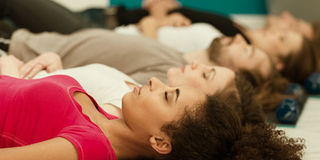Breathing exercises good for relaxation

Breathing exercises are easy to learn. You can do them whenever you want, and you do not need any special tools or equipment. NET PHOTO
What you need to know:
- Taking just a few moments each day to practice some deep breathing exercises can decrease stress, relax your mind, body and can help you sleep better.
Breathing is something we all do but few do it correctly. Most people have shallow, half-breaths that go no deeper than the chest. Diaphragmatic breathing is a simple way to relieve stress, lower your heart rate and blood pressure, and leave you revitalised.
Proper deep breathing can boost your performance because when you are breathing, the muscles breathe too. Deep breathing also strengthens the lungs.
How to do it
Robert Grace Mutebi, an aerobics instructor at United Fitness Health club in Namboole, recommends one to sit in a chair or lie on a mat and place one hand on your stomach’s base and take a deep breath.
“Ensure that your stomach pushes your hand up while your chest remains still. This maximises oxygen and opens up the lungs. Tight muscles and tissue surrounding the ribs will be loosened by deep breathing,” he says.
Alternatively, you can take a big, slow inhale; hold it for about three seconds, then, with your mouth closed, release a passive exhale. Let the exhale take at least twice as long as your inhale. At the end of the exhale, pause for a moment then repeat.
This slows down your heart rate and is helpful in relieving stress and anxiety since it settles the mind and slows your heart rate.
“Constant tension can contribute to migraines, back pain, and chronic fatigue, Mutebi says. Deep breaths can help relax the body and remove tension. This can be done if you lie down on the floor and combine the two exercises but on each exhale, focus on relaxing a particular part of the body, starting from the feet up to your forehead.”
For effective exercises
Did you know that taking in regular, deep breaths promotes the transfer of oxygen that empowers the muscles, and pushing out regular, deep breaths eliminates waste gases such as carbon dioxide?
Proper breathing is important for exercising safely, comfortably, and effectively. Although breathing at rest or during exercise is automatic, there are breathing techniques that can increase the effectiveness of your workouts and your endurance as you exercise (the amount of time you can breathe in comfortably during exercise).
While we are not exercising, we breath from the chest but Solomon Kirinya, a personal fitness instructor recommends breathing from the diaphragm. This will allow you to get deep, full breaths that fill your lungs with air and oxygen that your body needs for exercise.
You will know if you are breathing properly from the diaphragm by placing your hands on your lower ribs. As you breathe in, you will feel your ribs rise. As you breathe out, you will feel your ribs fall.
Breathing while you exercise
Kirinya says, “Relax your muscles and mind by standing or assuming positions that will enable you breathe from the diaphragm and not the chest. Lift up your chin to enable proper air passage then breathe in and out evenly and deeply.”
When you are walking, running or swimming, breathe through the mouth or nose at even intervals and make each breath you take in equal to each breath you push out.
If you do weight lifts, breathe out when you lift the weight and inhale as you relax into starting position. Adjust your breathing speed so that you may breathe in and out at a rate that matches your exercise pace
“Keeping a rhythm, counting breaths in and out, listening to music that aligns your breathing and exercise rhythm, slowing your exercise pace if you cannot catch your breath and focus on maintaining slow, even, and deep breaths until your breathing returns to normal as you cool down after your workout,” he warns.
Benefits
• Exercising more comfortably, safely, and for longer periods
• Preventing injuries such as hernias, spikes in blood pressure/strain on blood vessels, and back pain
• Increasing blood flow throughout the body
• Ability to relax
Note: according to Robert Grace Mutebi, an aerobics instructor at United Fitness Health club in Namboole: “If you are exercising for the first time or have taken long without exercising, it may be hard for you to control breathing but this improves if you continue exercising regularly.”




